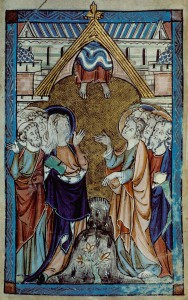 I won’t acknowledge Ascension Thursday Sunday. Yesterday was the Feast of the Ascension of the Lord and Sunday is, in the Ordinary Form, the 7th Sunday of Easter.
I won’t acknowledge Ascension Thursday Sunday. Yesterday was the Feast of the Ascension of the Lord and Sunday is, in the Ordinary Form, the 7th Sunday of Easter.
Let’s look at the Collect for the 7th Sunday of Easter.
Supplicationibus nostris, Domine, adesto propitius,
ut, sicut humani generis Salvatorem
tecum in tua credimus maiestate,
ita eum usque ad consummationem saeculi manere nobiscum,
sicut ipse promisit, sentiamus.
There is a spiffy parallelism here in sicut… tecum and ita… nobiscum.
There seems to be here a reference to Matthew 28:20:
“Et ecce ego vobiscum sum omnibus diebus, usque ad consummationem saeculi”
RSV: “I am with you always, to the close of the age.”
DR: “I am with you all days, even to the consummation of the world.”
Adsum is the verb that gives us adesto, which is the “future” imperative (because imperative has to be future). Adsum means to “be present” in both the physical and the moral sense. Thus, it means also “to be present with one’s aid or support; to stand by, to assist, aid, help, protect, defend, sustain.” And also, “to be present in mind, with attention, interest, sympathy; also, with courage; to give attention to something, to give heed, observe, attend to; also, to be fearless, be of good courage.” In the Rite of Ordination, and today is my anniversary, when men are called to receive Holy Orders, their names are pronounced (which is the formal moment of a “calling” – vocatio) and they respond, Adsum! Believe me when I say that that “Adsum!” which candidates for Orders proclaim means all of the above!
Maiestas has an interesting entry in the Lewis & Short Dictionary. This word fundamentally means, “greatness, grandeur, dignity, majesty.” In conjunction with other words it reveals something more. For example, maiestas means the “sovereignty of the Roman people” in classical Latin. Thus, we have the term for high treason: laedere maiestatem. In English we use the same phrase: “lese majesty” also in the French form “lèse majesté”.
Consummatio is technically “a casting up or reckoning together, a summing up, a summary view” as well as a “finishing, completing, accomplishing.” Think of doing a “summation” or doing your “sums”. Or being a “consummate pianist” to indicate a pianist who in his skills and artistry is “complete.”
LITERAL TRANSLATION:
Graciously give attention to our supplications, O Lord,
so that, just as we believe the Savior of human kind
is, in your majesty, with you,
we thus may sense him, just as he promised, to be remaining with us
all the way unto the consummation of the world.
OBSOLETE ICEL (1973):
Father,
help us keep in mind that Christ our Savior
lives with you in glory
and promised to remain with us until the end of time.
CURRENT ICEL (2011):
Graciously hear our supplications, O Lord,
so that we, who believe that the Saviour of the human race
is with you in your glory,
may experience, as he promised,
until the end of the world,
his abiding presence among us.
In the Person of the Risen Lord, the God/man, our humanity is at this very moment present at the right hand of God the Father.
When Christ ascended to the Father, our humanity ascended with Him. We are already there, but still not yet there. We must wait for the world’s consummation and final reckoning to join Them in our final state of endless contemplation of the Triune God.
Christ is still present to us. He is with us in the Holy Eucharist, in the Words of Scripture, in the person of the priest, in the gathering of the baptized.
Christ is with us, still teaching and governing and sanctifying us in Holy Church of which He is the Head. Through and in Him we are the Body, the members, the Church.
In that time after the world and everything and everyone has been put in the balance, and everything has been submitted by Christ to the Father so that God may be all in all, Christ the Head and Christ the Body will be, as St. Augustine might put it, Christus Totus: Christ Whole and Entire.


































Does Latin say end of the world or end of the age? I know a fair number of Greek translations among the Orthodox tend to translate (I don’t know why) “eon” to “world”.
Thanks Fr. Z.